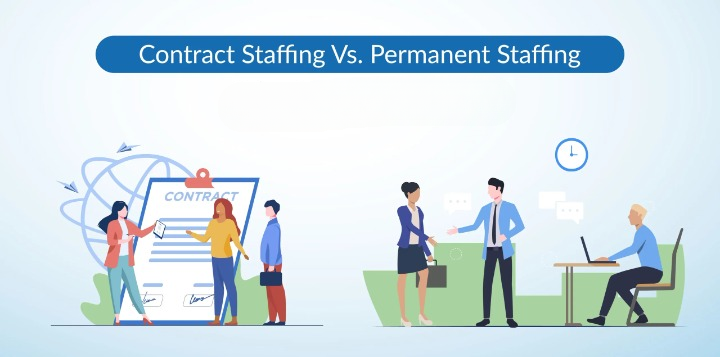When it comes to addressing financial compliance and workforce management objectives, companies often confront a vital decision: should they depend on permanent hiring or contract staffing? Both staffing models provide significant advantages, but the trick lies in determining which model best matches your company’s objectives, especially in industries where financial compliance is critical. Here’s a deeper look at the differences and benefits of both models, ensuring you make an informed choice.
Understanding Permanent Staffing
Permanent staffing refers to recruiting staff who are on the company’s payroll and work full-time for an extended term. These employees often receive a full benefits package, including healthcare, retirement programs, and paid leave. Permanent staffing is crucial to the long-term strategy of the business, especially in areas such as finance, sales, and operations, where continuous productivity and alignment with the company’s goals are critical.
From a financial compliance viewpoint, permanent staffing ensures stability and control. Since permanent workers conform to the company’s own norms and regulations, including tax reporting and perks, it streamlines the compliance process. Permanent staff are simpler to educate and match with the company’s regulations, which is vital for businesses that demand stringent financial inspection.
What is Contract Staffing?
Contract staffing, on the other hand, entails employing staffing for a specified duration or specific projects. These contractors, often employed through a staffing partner, are bound by the terms of a contract, which sets the length, payment structure, and project scope. Contractors are not employees of the organization but external persons recruited for their skills or to meet pressing demands.
Contract staffing gives flexibility in hiring and controlling staffing expenditures. From a financial compliance aspect, contract staffing can lessen the burden associated with long-term employment obligations such as pensions, insurance, and paid leave. However, it’s crucial to ensure that your contractors comply with the tax requirements set for independent workers since failure to categorize people appropriately can lead to fines.
Advantages of Permanent Staffing for Financial Compliance
One of the important advantages of permanent hiring is the long-term retention of staffing, which can be vital for maintaining consistency in departments that deal with financial compliance. Employees who remain longer can be taught to undertake certain compliance-related duties, decreasing the risk of mistakes and non-compliance.
Additionally, permanent workers are easier to oversee under a company’s standards involving tax filings, payroll taxes, and benefits. The corporation has complete control over the remuneration structure, providing better transparency and simpler audit trails, guaranteeing that all financial documents are in conformity with regulatory standards.
Benefits of Contract Staffing for Financial Compliance
Contract hiring provides its own set of advantages, particularly for organizations seeking cost-effectiveness and flexibility. Contractors do not require the elaborate benefits packages that permanent workers have, which can drastically decrease expenses. This is particularly advantageous for companies that need to scale up or down depending on project requirements or market conditions.
Moreover, contractors may be employed to address skill shortages rapidly, allowing organizations to respond immediately to unique financial compliance demands. Contract employment, provided through a staffing partner, gives transparency on payment terms, and there is no need to supply benefits, lowering financial liabilities in the long run.
Which Staffing Model is Right for Your Business?
Choosing between a contract partner and permanent hiring relies on your company’s particular demands. If your organization wants stability, and has the means to offer competitive benefits, permanent employment can be the preferable option. It also provides for greater alignment with business culture and smoother communication.
However, if your organization operates in a dynamic environment where flexibility is needed to fulfill short-term demands or specific capabilities, contract employment might give a more flexible, cost-effective alternative. Hiring through a staffing partner may shorten the process, ensuring that the contractors fulfill your financial compliance rules without long-term commitment.
Conclusion
Both contract and permanent hiring provide unique advantages in terms of financial compliance and labor management. BGC is a publicly listed recruitment agency trusted by both government and private sectors for hiring. With over 19 years of industry experience, it has helped companies recruit more than 50,000 workers globally and supported 2,200+ contractors. For companies with long-term goals and a requirement for ongoing compliance standards, permanent staffing gives stability and control. On the other side, as a contract partner, BGC offers flexibility and lower costs for short-term or customized compliance needs.


